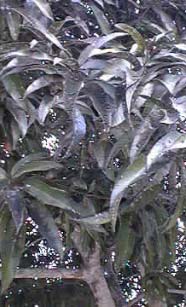An audience with the king, the trickle down effect, and the Berkeley boogaloo
I spent a week in Soyo with the amiable, knowledgeable staff of Pesnorte, an organization working with local artisanal fishing communities. One afternoon, we set out to find the local rei do povo (the traditional ruling authority or literally, king of the people.) We bumped along sandy roads marked more by chicken scratch and footprints than tire tracks. Oil wells dotted the landscape: some rusted and dormant, while others gurgled and sputtered fortressed in coils of barbed wire. Children played in the dust-swept squares surrounding the wells and women filed through balancing bundles of leafy collard greens, tubs of shelled peanuts and bulging roots of manioc on their heads. Pipelines snaked from the oil wells through the small agricultural plots, disappearing in tangles of green.
 Villagers believe the dark film coating leaves on the trees is a result of nearby oil production |
The rei do povo greeted us with deep tin mugs of palm wine and seated us in the yawning shade of a cashew tree. He explained how oil production had affected the lives of his people: the land for the wells had been stolen or bought at unfair prices, the agricultural productivity of the area was threatened by pollution and their health was failing. He plucked a leaf off of a nearby mango tree and indicated that the same dark film coating the leaf was in his lungs. The rei do povo recalled how the government had promised that oil exploration would stimulate local development. He lamented that only the bases and corporate offices were furnished with electricity and running water and that the only roads constructed in the area ran between oil industry facilities.
People in the nearby fishing communities in Ponta do Padrão echoed the rei do povo's claims. They added that oil spills in the Zaire River were not uncommon and often ignored. As a result, the fish stocks had crashed and the communities suffered a lack of potable water. They had not been compensated for their losses and regaled me with stories of the enviable Cabindan fishermen who received enough compensation to buy cars and motorboats after a 1999 spill there.
I scribbled some final notes from our conversation and prepared to leave, when the community coordinator said, "Wait, she must dance!"
"'Dance?," I blushed. One of the younger fishermen darted off to a nearby house and returned with a jerry can, flipped it upside-down between his knees and began to slap a beat on it with a thick stick. The older fishermen claimed that the village had accepted visitors since 1482 and tradition dictated that they dance before leaving. And so, the coordinator and I stomped about in the sand, shaking our hips and laughing. The women peered out from the doorways of their homes and the children shrieked. A wrinkled fisherman clapped his calloused hands and cried, 'Sim, a Dona Kristina sabe dançar!'
"Yes," said the fisherman, "Ms. Kristin knows how to dance!"
— Kristin



